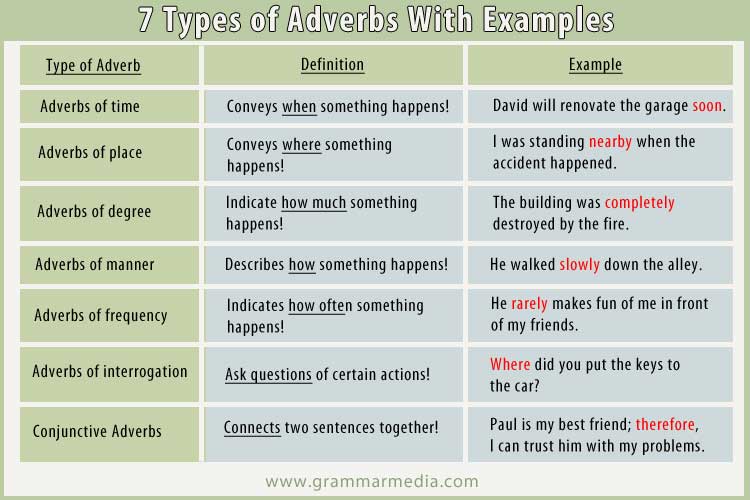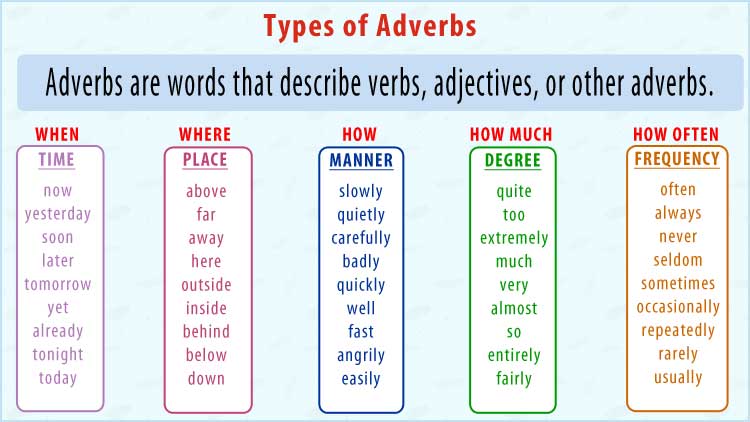Adverbs are an essential part of English grammar. They explain how, when, where, and why an action occurs. However, not all adverbs function the same way.
There are 7 types of adverbs in English grammar: adverbs of time, adverbs of place, adverbs of degree, adverbs of manner, adverbs of frequency, adverbs of interrogation, and conjunctive adverbs.

What are Adverbs in English Grammar?
Adverbs in English grammar are divided into three distinct classes or categories: simple (5 types), interrogative (1 type), and conjunctive adverbs (1 type).
However, to explain the function of adverbs in English grammar, it is advantageous to divide them into 7 types of adverbs, which we will do in this post.
What are the 7 Types of Adverbs With Examples?
- I must finish the assignment now. (time)
- David struggles with vertigo and needs to sit down when it happens. (place)
- The house almost passed its final inspection. (degree)
- Timothy carefully painted his sister’s portrait. (manner)
- We never take the bus to school because it is too dangerous. (frequency)
- Where did you go after the game? (interrogative)
- Peter studied diligently for the exams. However, he only just barely passed. (conjunctive)
Helpful Hint: Keep in mind that simple adverbs are words that modify verbs, adjectives, or other adverbs. Interrogative adverbs ask questions, and conjunctive adverbs connect two clauses.
7 Types of Adverbs With Examples
1. Adverbs of Time
Definition: Adverbs of time are words that tell when something is happening.
Some Common Adverbs of Time: They include now, today, soon, before, tomorrow, yesterday, already, recently, and tonight.
For Example:
- Matthew and Mark will meet tomorrow to discuss the plans for our new house.
- Peter recently relocated his business to a new building.
- Jenny will turn on the airconditioner now.
- Trump has already won the Republican nominee.
- We will go tonight to watch a movie at the cinema.
- David will renovate the garage soon.
- The police will travel immediately to the crime scene.
- The lazy worker was fired immediately.
- I am busy today, but I will see you tomorrow.
- David finished the project yesterday.
Helpful Hint: Adverbs of frequency (see below) are similar to adverbs of time. However, adverbs of frequency convey how often something happens whereas adverbs of time convey a definite time when something happens.
2. Adverbs of Place
Definition: Adverbs of place are words that describe the location of an action or event. They provide information about where the action is happening or where something is. There are three categories of adverbs of place: direction, distance, or position.
Some Common Adverbs of Place: They include here, there, everywhere, above, below, and nearby.
For Example:
- Luke jumped up when he stepped on the snake. (direction)
- I was standing nearby when the accident happened. (distance)
- I put it there so that no one would see it. (position)
- I got down from the roof without hurting myself. (direction)
- He poured the drink out. (direction)
- You will find no money here. (position)
- The drugie walked around in a daze. (direction)
- The markets are far from our normal route. (distance)
- Is that your bike there? (position)
- The cat climb up into the ceiling of the house. (direction)

3. Adverbs of Degree
Definition: Adverbs of degree are words that describe the intensity of an action or quality. Adverbs of degree express the level of intensity of verbs, adjectives, or other adverbs.
Some Common Adverbs of Degree: They include very, really, extremely, too, deeply, much, quite, and so.
For Example:
- Timothy was extremely brilliant in his presentation.
- The police officer was quite agreeable in accepting our eye-witness account.
- The building was completely destroyed by the raging fire.
- He was deeply moved by her testimony.
- James was absolutely certain he put his keys on the kitchen table.
- Peter was so excited to share his story with his new friends.
- Susan just finished her assignment in time.
- David completed the work really well.
- The girl was very beautiful.
- He nearly passed out from exhaustion.
Helpful Hint: Adverbs of degree, when modifying verbs, adjectives, or other adverbs, are often placed before them.
4. Adverbs of Manner
Definition: Adverbs of manner are words that convey how something happens. Adverbs of manner usually end in “-ly” like (carefully, closely) but not always like (well, fast).
Some Common Adverbs of Manner: They include slowly, badly, well, carefully, angrily, and fast.
For Example:
- Rebekah drove carefully during her license’s test.
- Paul played the game well.
- Peter and Wendy lived happily together in their new home.
- He walked slowly down the dark ally.
- The college students studied diligently to pass their final exams.
- Jennifer wisely took her friend with her while investigating the situation.
- Neville skillfully carved out the wooden statue.
- The security guard bravely rescued Peter from the drunken mob.
- Everything went well during the party.
- Rachel sang cheerfully during her stage appearance.0
Helpful Hint: “Well” and “good” have similar meaning so don’t confuse them. “Well” is an adverb and it modifies verbs and “good” is an adjective and modifies nouns. For example: He did the work good. (incorrect) He did the work well (correct) or he did good work. (correct)
5. Adverbs of Frequency
Definition: Adverbs of frequency are words that convey how often something happens or how often something takes place.
Some Common Adverbs of Frequency: They include often, sometimes, occasionally, always, rarely, seldom, repeatedly, and never.
For Example:
- I occasionally play football, but I don’t enjoy the game.
- He rarely makes fun of me in front of my friends.
- James repeatedly made the same mistakes during his younger years.
- David seldom gives advice to those who never ask.
- Peter and James often watch the game together.
- People always hurt the ones they love the most.
- I sometimes wonder what life would be like living on an Island.
- Paul often takes advantage of his friends.
- Timothy sometimes sings in the shower.
- Jonathan and Emma occasionally go on trips together to take time away from work.
6. Adverbs of Interrogation
Definition: Adverbs of interrogation are words used to ask questions about the time, place, manner, degree, reason, or frequency of an action.
Some Common Adverbs of Interrogation: They include where, when, why, and how.
For Example:
- How did you design that plan? (manner)
- Where did you put the keys to the car? (place)
- When will the next bus arrive? (time)
- How often do you visit your parents? (frequency)
- How did you manage to solve the puzzle so quickly? (manner)
- Where did you find that beautiful painting? (place)
- When will your dad and mum arrive? (time)
- How much did it cost to go to the movies? (degree)
- How did you discover the answer to that difficult question? (manner)
- When will you present the findings of the autopsy? (time)
- Why are you crying? (reason)
7. Conjunctive Adverbs
Definition: Conjunctive adverbs are words that connect two clauses or two sentences. They act like conjunctions.
Some Common Conjunctive Adverbs: They include however, nevertheless, besides, instead, therefore, nonetheless, and otherwise.
For Example:
- David has two battery for his drill; therefore, he can charge one while using the other.
- We all went to the beach for the afternoon; however, the surf was very rough and we were unable to go for a swim.
- We decided not to go to the movies; instead, we went to our friend’s place.
- Our friendship has been challenging; indeed, it has been tested many times.
- I don’t think we should go out tonight. Besides, I have a lot of work to do.
- I wasn’t confidence that my speech would go well; nonetheless, everyone seemed to like it.
- Lollies are not healthy for you; instead, you should eat more fruit.
- Peter loves fishing; in contrast, his brother seldom enjoys it.
- I went to the auto shop; however, they didn’t have the items I wanted.
- Paul was my best friend; therefore, I could trust him with my problems.
The 7 Types of Adverbs With Examples
| Adverbs of Time | Conveys when something happens! | David will renovate the garage soon. |
| Adverbs of Place | Conveys where something happens! | I was standing nearby when the accident happened. |
| Adverbs of Degree | Indicates how much something happens! | The building was completely destroyed by the raging fire. |
| Adverbs of Manner | Describes how something happens! | He walked slowly down the dark alley. |
| Adverbs of Frequency | Indicates how often something happens! | He rarely makes fun of me in front of my friends. |
| Adverbs of Interrogation | Ask questions about the manner, time, place, or frequency of an action! | Where did you put the keys to the car? |
| Conjunctive Adverbs | Connect two sentences together! | Paul is my best friend; therefore, I can trust him with my problems. |
